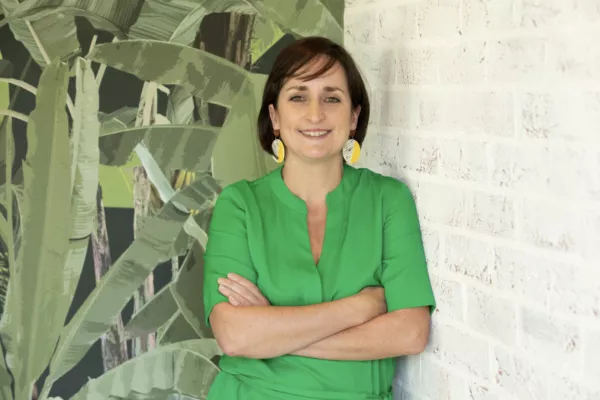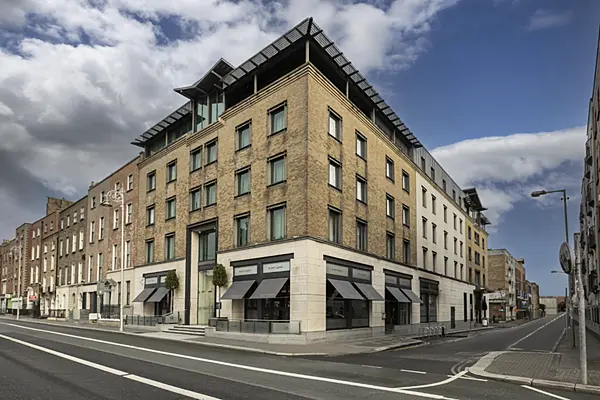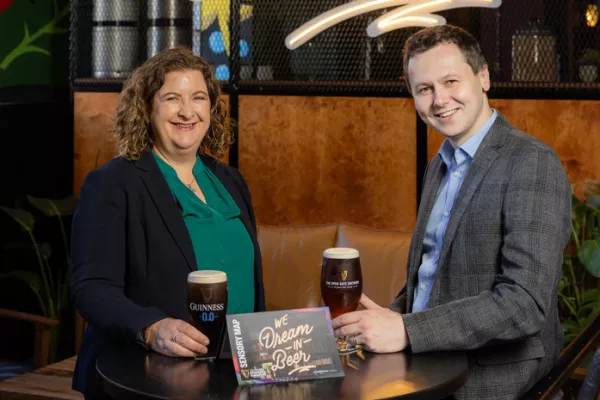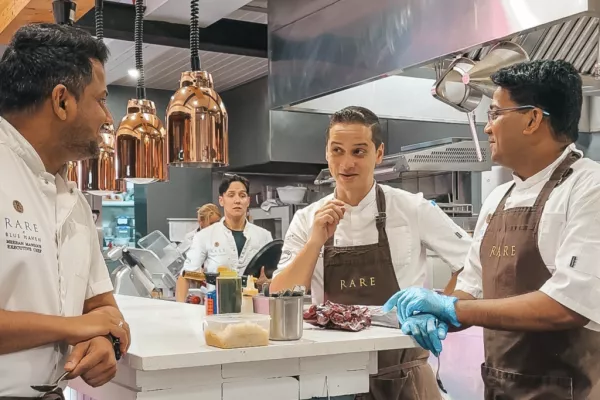Open Kitchen Week, an initiative from Chef Network, will be returning nationwide from 11 to 17 November, and registration is now open for host kitchens.
Launched in 2023, the inaugural event saw over 50 of Ireland’s professional kitchens invite 300 members of the public to experience what it’s like to work in a real, professional kitchen.
Kitchens already signed up for 2024 include Michelin-starred Aniar, the Clayton Hotel Galway, the Osprey Hotel, the Guinness Storehouse and Killeavy Castle Estate.
Ruth Hegarty, food policy consultant and Chef Network spokesperson, recently spoke to Robert McHugh about what can be expected for Open Kitchen Week 2024, her own passion for food and what surprised her most about last year's event.
Tell us about Open Kitchen Week 2024.
Open Kitchen Week is an initiative from Chef Network, which itself has been around since 2016. We wanted to set up a community or organisation that every chef in the country could be a part of.
We took the route of setting up a professional network for chefs. We want to promote community and support amongst chefs. We want to promote education and professional development.
It is about attracting people into the industry and really trying to work on changing the reputation of the chef profession.
We do this by promoting the positives but also by being honest and realistic about some of the challenges and doing a lot of work around improving the culture and work environment. We let people know there are a lot of great opportunities in the industry.
The idea for Open Kitchen Week came up in March 2023. We were having conversations on an ongoing basis about how chefs are represented in popular media which can focus on the more negative aspects of the industry.
We have a brilliant advisory council of chefs from all different sections of the industry and different levels of their career.
There are so many people out there doing really great work. There are really positive kitchens helping people, nurturing their careers, we just don't really hear about that.
We just thought wouldn't be great if you could just open up kitchens and show the public what is happening and how chefs really love what they do and have great teams in a great environment.
It stemmed from there, I asked some chefs if they would be interested in showing interested members of the public around their kitchen, young people finishing school, or someone thinking of a career change. Anyone really.
At some level, everyone has an experience of eating out and being cooked for by a chef but rarely do people get a glimpse behind the scenes. It is mysterious for people.
We wanted to bring people into the kitchen but not in a way that they were coming in to get demonstration from a chef. We really wanted people to see what it is like to be part of a working kitchen.
Open Kitchen Week will be taking place from November 11-17, where members of the public can book a slot to come in to the kitchen and experience what it would be like to actually be part of the team of chefs during their workday.
In most cases, people will come in and a member of the team will accompany them and look after them. They will get introduced to all the members of the team and will get an idea of what people's roles are, the work involved and how the day runs in the kitchen.
They may get to do some simple hands-on tasks like making some bread, some plating of dishes or basic prep. I think they get a good handle on what life in the kitchen is really like.
What surprised you most about last year's event?
What really struck me last year was just how much chefs embraced the idea, once it came up.
We really just decided to pilot it last year. We weren't looking to get big number of kitchens involved. We knew we needed to test the idea to figure out exactly how it would work, how the system would function with people booking slots.
We expected a limited number of kitchens onboard to help us figure this out really. We decided we were not even going to promote to the whole Open Chef membership, it was more word of mouth from our advisory council, who spoke to chefs who we thought would be interested in getting onboard.
Pretty much every chef who was approached last year said, "Yes, it's a great idea, I'll do it." That is what was the most surprising to me, how quickly chefs embraced it.
As readily as it was accepted last year, it was quite challenging this year to get kitchens onboard. I think that is a reflection of where the industry is at. While they were in a challenging position last year, things have become more difficult this year. Unfortunately, the morale is quite low in the industry.
The focus for Chef Network has always been about trying to be a support for the industry, and to enable chefs to help each other. We really need to think about that more than ever.
Unfortunately, there has been a lot of firefighting going on and even looking as far ahead as November, it is actually really difficult getting people to commit.
It is a vicious cycle. When you are firefighting, you are not thinking about the long-term and then the long-term outlook does not improve if you are not able to put some thought into it. What we are trying to get across is that this is what we need to do for the long term to get more people into the industry.
We want to improve the situation in terms of bringing talent into the industry and making things better for the people who are in there presently as well, so they are not overworked, that they have the balance that they need in their lives as well.
What changes will you be making this year?
From an organisational point of view, once we tested out the idea last year, we were happy to move forward with setting up a dedicated Open Kitchen website and booking platform.
We want to simplify the process as much as possible for chefs who are hosting to sign up people for the slots that they are offering. The guest can log on and see what kitchens are hosting and book their places.
Our ambition for this year is to get more kitchens involved but to have a good geographical spread. We went out to kitchens and let them know that we would be happy for them to take a maximum of three slots per day, I mean they can offer one slot if they like.
We generally say a maximum of three because we have some kitchens last year that were really generous and had multiple people in every day for the entire week. So they could be offering 30 slots in a week which was amazing!
However, we really want to make this as accessible as possible for people around the country. We really want to get as many kitchens on board as possible but not with a huge commitment from them in terms of how many slots they will offer.
We want to make it really easy and realistic for chefs to take part and for establishments to take part.
The message that I want to get across is that this is a really positive thing for the long term of the industry but we also recognise how challenging things are at the moment.
Even if they are happy to offer one slot, two hours would be the minimum, on one of the days that week, it would be fantastic to have them on board and to give someone the opportunity to be behind the scenes in their kitchen.
Please tell me a little bit about your own background – where you grew up and studied.
I am from Galway. I grew up in Moycullen in West of Galway City.
I have always had a huge love of food and my mother had a home bakery basically, a bakery attached to her house.
I was stirring bold mixtures there from a very young age! I was really, really passionate about cooking.
Like a lot of people, my parents thought being a chef did not sound like a great idea. They thought I should go an academic route and if I want to do cooking later on, that's fine. Unfortunately, that perception of the industry got in the way there.
I studied in NUI Galway or University of Galway as it is called now. While there, I got a degree in English and Italian.
I then went off to study European Policy but I wasn't able to forget about my love of food so I focused on CAP and Agricultural Policy and my dissertation focused on Food Quality Policy.
That led me into a 20 year career working with the food sector and I have had a really great buzz working with chefs in the hospitality industry.
I ran Euro-Toques Ireland for over ten years. It was very busy back then, getting involved in policy issues and getting involved in really great food initiatives.
I have always been really passionate about policy and that led into studying for an MA in Food Policy in City University London.
Much of my work is in the area of food policy research and trying to advocate for better food policy, however, I still do a lot of work with chefs in the hospitality sector, that is what I really enjoy as well.
What do you enjoy most about your current role?
My work is very varied and I am massively passionate about food and the power it has to be a really positive influence in our lives.
In terms of working with Chef Network and with the hospitality sector, what I really love about it is the people and the can-do attitudes that they have.
One of the wonderful things about working with people in foodservice and hospitality is that they are used to just getting things done. They don't tend to put work off. They are more proactive about getting things done rather than just talking about things.
I love that because if you come up with a good idea, they will get behind it and make it happen.
What other challenges does the food industry face?
It is such a tough time. We have seen so many restaurant closures in recent times.
There are acute challenges that we have now, many of which are a hangover from COVID 19. The changing VAT rate, increase in renumeration, cost of utilities, rent, all these challenging financial aspects are really hitting home.
We have much more long-term issues around staffing, particularly for kitchen staff. I think it is an issue across the board.
A huge amount of food establishments have opened in recent years. The landscape has probably changed quite a lot. Maybe the argument could be made that there are too many outlets and we are naturally just going to be better when they fall away.
I think the sad thing would be that if we lose a lot of our good independent restaurants, it would have this really important trickle-down effect in terms of supporting local farmers and producers. These are the types of establishments that maybe have small teams where young people get really good opportunities to train and upscale.
If we are left with more generic offerings where there is less skill involved and there is less support of local food producers, this would be really sad.
There needs to be more support for the independence of the sector, to make sure that survives because it's such a key part of our culture and our offering to communities and also for tourists.
Do you have a business motto?
I have to do things that I love and believe in.
What do you like to do when you are not working?
I like to cook. The thing I probably enjoy most is swimming in the sea.








